

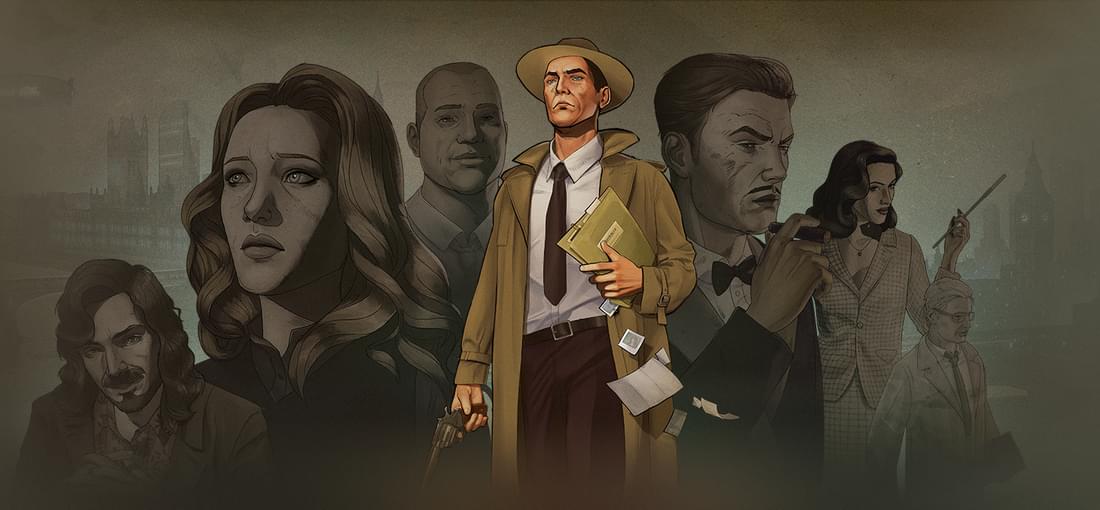
The graphics are neat, voice-acting is okay, and the idea of combining a whodunit with coffee manufacturing sim is refreshing. There is a management aspect, there is a trade aspect, there is a detective aspect, there is most gamers' elixir named coffee in abundance, and then there is the brilliant setting in some retro-dystopian London. Which has been crafted beautifully, in my eyes. But then there comes the in-game tutorial. Let's hope you have an hour or so to spend into learning even the basic mechanics of the game -- which will remain utterly basic and blunt in all aspects. The tutorial is a hassle. It is just bad, no fun at all. Time better spent watching some detective movie, or reading some private investigator graphical or text novel. The bad thing is not so much that the mechanics are unintuitive -- they are pretty easy to manage, despite the full failure of the utterly simplified negotiation part. The bad thing is, in my eyes, that there is absolutely no replayability. Okay, may seem legit for a linear story-based game. But then, usually story-based games don't take that much time to get familiar with. So no matter whether you are at home in the genre of detective games, of business sims, or of just storytelling -- the areas you are not so fond of will prove a huge burden. The good thing with sim games is that they have high replayability by altering a lot of variables in between plays. This is null and void due to the detective part. The good thing with story-driven detective games is that they may create dramaturgical atmospheres, without too much of a distraction. This is spoilt by the interspersed management and negotiation parts. The good thing with negotiation is that you might learn something useful. But not here. This is a single simplified generalisation of the topic, and it will be interrupted by the other parts. I like all types. But not this game. It has failed my tastes -- except for the graphic design. Too much crossover for me.
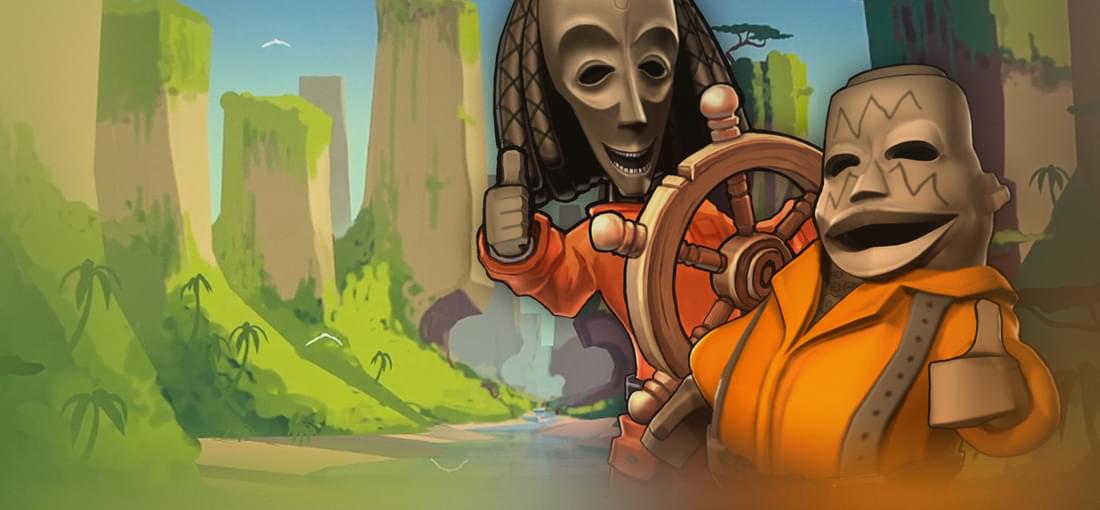
Having completed all three parts, the verdict is out: The Journey Down is a pleasant point-n-click adventure with an African, at times Caribbean, air to it. It is centred around two chaotic guys who, of course, need to rescue the world. The design of the enjoyably childish protagonists is fun. There is a wide variety of locations, and puzzle difficulty is rather easy (albeit at one point funnily counter-intuitive, loved that laundromat sequence for that reason). The soundtrack for this game is outstanding. In addition, I did not find a single severe bug in this game. So much for this entertaining linear game's strengths. The flipside are the abundant inconsistencies in terms of graphics and sounds, both at times stunningly beautiful, at times far from state of the art. You will encounter a sudden change of art style, somewhere in between stop-motion optics and plain cartoon drawings. This will at times disturb the atmosphere. Then there are deficits in the game's speech bits: The volume will vary to quite some degree, which will take you aback, and there are even some improper recording bits. The plot is quite a mixed bag. There are gods in there, (superficial) love stories, there are urban themes, there are pirates, and of course there are evil culprits (or even demons) trying to destroy the world for whatever reason. The character design is utterly flat: There is hardly any space for ambivalence, characters are either good or bad (even though they might change). In terms of culprits, it is the usual »corrupt elites« stuff found everywhere in computer games since decades. As opposed to other adventure games, there are not too many Easter eggs to be found. All in all, it is a good-humoured, entertaining game without too many ambitions besides entertainment. And excellent music. The downsides are the inconsistencies w.r.t. graphics and sounds, which give the game a bit of a cheap touch at times. But in general, the devs put a lot of heart into it. Lovable.
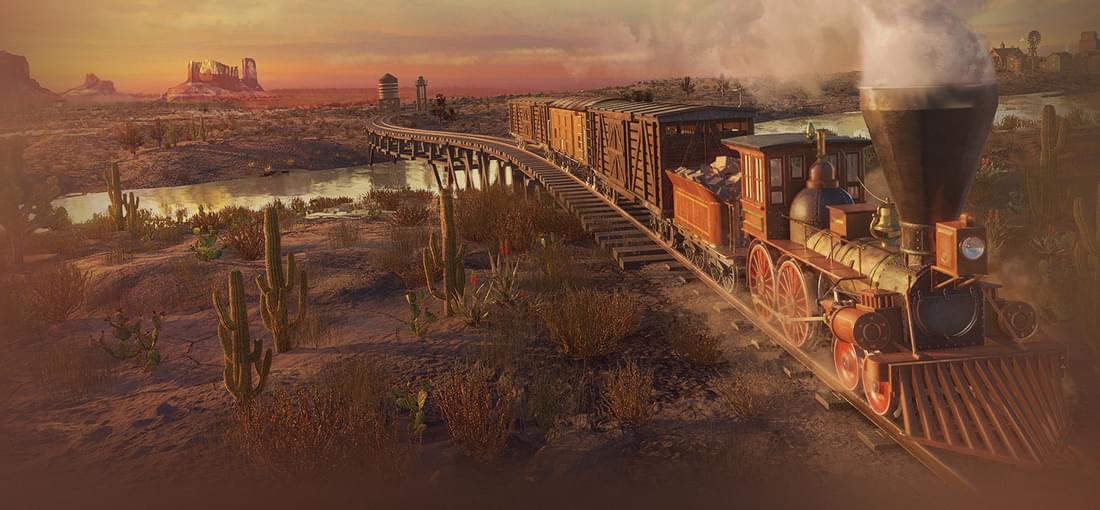
I shall be commenting on the Linux version. Issues may differ. Railway Empire is yet another railway-building game, but its core falls a bit short for gameplay with a mixed bag of other components: (1) There is a »commercial buildings« component included: Profit from your own factories. (2) There is some auction mode included (for factories or progress). (3) There is some sort of stock trading included. (4) In the Free Game mode, there are AI opponent magnates with ever-the-same sound bites. (5) And there is some personnel management included (almost all have one trait, and this trait needs to fit to the other staff on the same train) This said, every single one of the approaches is half-hearted: (0) The main thing, rail building, is just poor. There is no advanced way to set signals or have trains take different routes on condition. Sometimes, fragments of rails will remain on the map after destruction of elements, without any option to get rid of them. Grouping of trains is not possible, each train must have its own schedule which mus be set manually. Which is really bad when redesigning a map with dozens or hundreds of trains. And while you are setting your new routes, time will be ticking away. Schedules do not exist. Even more so, there is not a single good overview of trains or personnel. You will need to scroll up and down forever in your big-lettered train list. There even is no chance to have passengers with a set destination. They will just take the next train to anywhere, which is poor design. The rest is too rudimentary. Therefore, features annoy rather than add to the game. Gameplay is strenuous -- the UI is just painful. You will end up clicking a multitude of buttons because there is no direct way to get wherever you want. Auto saves do not work with Linux at all. The game crashed once within a week or so. Overall, though, the game has some board game appeal to it. And due to its generic nature, it has good replayability. It is okay.
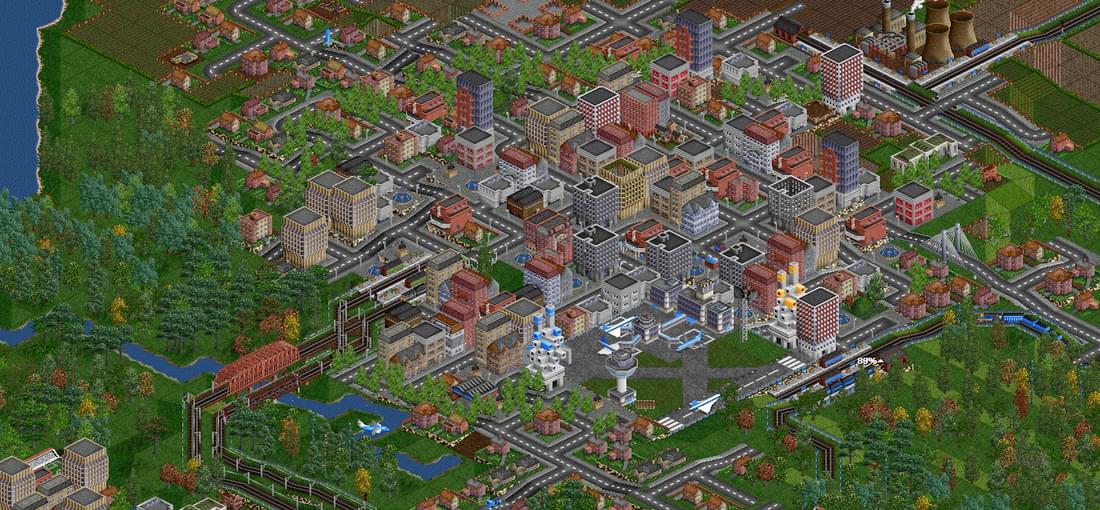
OpenTTD is a really good and mature game -- in being a transport simulation. The graphics are old-fashioned, there is no real end of game, and controls are utterly unintuitive (at least with my Linux / Unix version): You need to hold the mouse key to open a context menu, and it took me ages to find out about how to colour different vehicles (the colour was visible, but it would have never occurred me where to click in order to apply a change). Then, there is the problem that renewing your vehicles is highly burdensome and often requires a lot of manual effort (it's easier when switching train types, e.g.). But what I find most annoying is the inherent AI of transport: Passengers do not seem to go from one place on the map to the other, but only to the next station, whichever that is. Goods do not have to be transported to one specific place, which would allow for building a network, but they only need to find some demand anywhere. This said, the game is pretty awesome. I consider it best to play train-only, maybe (only maybe) use road transport as well. Never use planes, they will spoil the challenges inherent in map design and economy. The standard route to riches is easy: Go for coal and connect several mines to a power plant each (it ought to be more mines than power plants, for plants are only drop-off). Keep in mind that distance has the major impact on profits. So the more supply and demand are topographically apart, the sooner you grow rich. Counter-intuitively, do NOT go for the shortest route, but for the longest you can afford. Between loading and unloading, that is. After unloading, direct your trains to a loading point nearby (a coal mine, e.g.) and have them go back to an unloading point in the vicinity of the original loading point. That makes it: A (load, mine) >[far]> B (unload, plant) >[close]> C (load, mine) >[far]> D (unload, plant) >[close]> A. Oh, and group your vehicles. Good old game with outdated mechanics and a rough edge -- but fun.
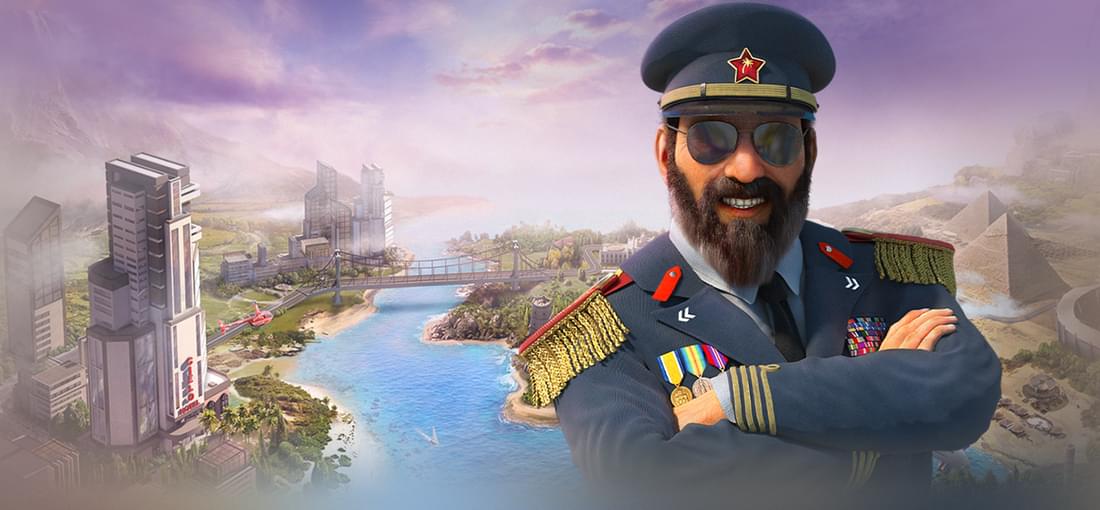
The overall impression is good -- were it not for several really annoying bugs. But first things first: Tropico is an economy simulation of a small tropical archipelago. You are the appointed or elected or »elected« head of the archipelago and need to get your island society bustling. You typically start off during colonialism and undergo several eras (colonial age, pre-WWII stage, Cold War era, and so on), and depending on the era you have different options to consider when shaping your economy or society. There is a small military element as well, but it is only defensive. The game is interspersed with (initially) witty comments about banana republics, and the love for detail is good in most places. The loading screen is accompanied by fun facts about real dictators, for instance, or there are different sea animals around. The graphics are quite okay, and the gameplay is nice, overall. However, even years after being published, there are still extremely annoying bugs. Here is a collection with the sandbox mode: (1) Save game modifications. Loading save games is not an option -- soil conditions are altered all over the map with loading, and rocks appear out of thin air and break roads or buildings. (2) Military stuck. Military units are regularly stuck and of no use. Other units as well. (3) Notification issues. Quests are not displayed, but you are punished for not fulfilling them. (4) Raids in vain: Once you have run out of blueprints, you may still get a nonce blueprint (i.e., no content). (5) Unit display problems: Units tend to appear or disappear out of thin air and in parts only. The first point mentioned is the worst, for it severely breaks save games. You will need to reshape all. Good game, bad bugs. Two more things: (!) As opposed to GOG info, the Carribean Skies DLC *is* available for Linux and functional. (!) But be aware: The Linux installer takes 50GB during the installation progress (freeing some 20-30 GB afterwards again).
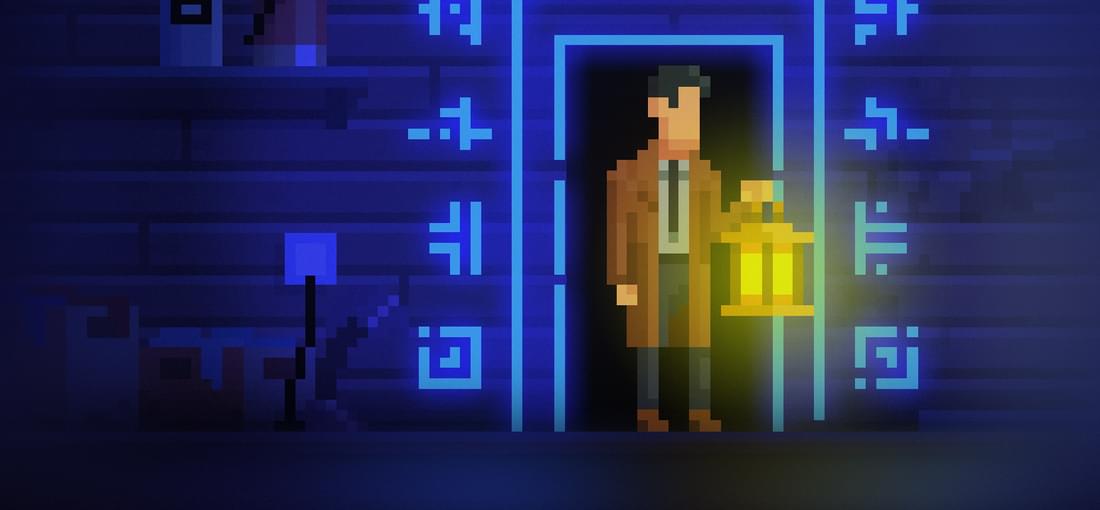
With the Linux version (Ubuntu-based, could hardly be more standard hardware) there are severe issues with the game graphics which render this game literally unplayable. Basically half the screen is constantly flickering, the cursor is invisible at times. Even though I have done some meddling, nothing has helped so far. The same issue does NOT occur with the successor game, the graphics of which work all fine on the very same system. The bad thing is that the successor relies on its predecessor (i.e., this game) in terms of the plot. Therefore, both are not worth buying unless the developer decides to eventually start fixing things (which apparently they would be capable of if they wanted to). Graphics problems (such as black screens, or flickering) have not been fixed by Spooky Doorway / Akupara even though they have been existing for years. Linux gamers be advised to test thoroughly with the aforesaid companies. The persistent lack of care and support by the developer unfortunately voids all effort put into their games, which most likely results in bad experiences on all sides. Therefore, to actually learn about the contents of the game in case it turns out working properly, please consult the other reviews at hand. In a nutshell: Not too bad. But chances are you will end up with a substantially crippled game and not get to know the positive sides.
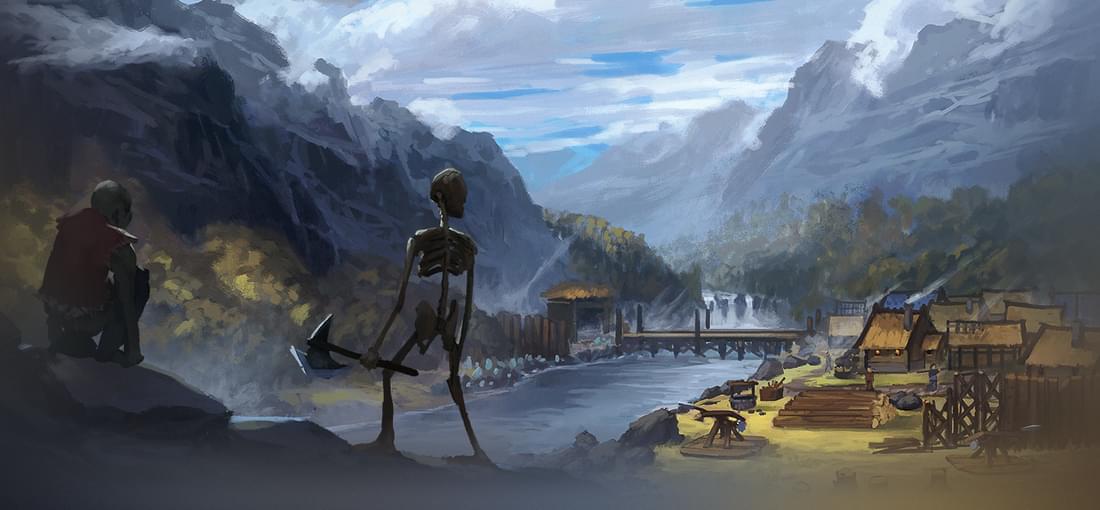
Rise to Ruins reminds me of RimWorld straight away. You need to set(tle) up a community and survive through seasons and against enemies. The overall strategy part is neat and straightforward and is clearly related to RW mechanics: There is a world map and the option to migrate, there are animals and crops, weapons and armour, and people as well as animals will produce offspring -- but all in all it is lacking most of the tuning options RW offers. It does not keep up with RW at all. But that is okay, since I reckon RW a real gem. It is fun to found your village and update buildings. There are really brilliant details in, for instance, the player's role as some kind of deity: You may help your workers by harvesting with the cursor, but if you do and people see, say, lumber floating through the air, they run away screaming and abandon their work. However, the fun does not last very long, for game mechanics are severely flawed with Rise to Ruins: The only aim is to survive against a fiendish enemy called »Corruption«. There is no way to beat corruption, there is no different factions, and there is not even a satisfying battle mode. Basically all fighting takes place automatically. Your aim is to survive as long as can in (all) different areas of the world map, which are predefined. This is yet another matter: The game mechanics are dull. There is no good path finding, for instance. This lack of mechanics has resulted in the strategy of building wall mazes in order to gain the upper hand: The enemies will walk along the walls as long as there is an opening somewhere. This has been adopted as the standard way of remaining in the game: a nice way to hide deficient AI. Speaking of deficiencies, the graphics are bad. Really bad. In the first few hours, this will be compensated by nice gameplay. However, the game will turn utterly pointless soon after. A simple win condition would have prevented the bore which will set in soon. It could be really good. Were there a point.

In spite of its awesome quality up to its breaking, the Linux version of the game does not work. There is a general bug at Act II, Scene V among basically all distributions. (See https://steamcommunity.com/app/231200/discussions/0/1751276551821695361/ and count me in…) Linux gamers -- beware of this scam! You are not getting what you paid for.

Stellaris is meant to be a relatively big and well-designed astro strategy game. And, well, the concept is good, the graphics are nice, music is apt, gameplay is rather rich in options -- or it would be, but unfortunately the developers failed in providing even the minimum functionality for their product. There is an old bug, for instance, which prevents context menus from showing up. But those are essential for the gameplay. Therefore it does not even deserve a single point out of 5. It does not work. No more gameplay to consider there. Therefore alone, Stellaris is a clear fail -- except for those who like to spend their idle time by installing and uninstalling to no avail. Even though in general GOG seems to be facing rather severe quality management problems these days, I would attribute this specific unfunctionality to the developer, Paradox Interactive. It has been a well-known bug for years.

In Sigma Theory, your task as the national head of the sigma project is to get your science right, and to get it right and powerful in a way that allows your nation to succeed over its competitors. In order to achieve this, you control a bunch of agents who try to convert, bribe or sexually convince enemy scientists to work for your country, or your agents may abduct scientists. There are elements of diplomacy, counter-espionage, »hacking«, exfiltrating action, and terrorism support involved as well, and a little bit of, well, marriage management. The whole thing is a bit dystopian; each scientific achievement comes with its advantages for you or your enemy countries, respectively. All in all, it has a design that might as well fit a board game by its mechanics. The overall idea is pretty good, and the game does not have too many bugs (except for minor translation flaws where French has been conserved, oh, and the Nigeria DLC does not work at all with me). In a way, it is a round-based strategy game: When do I send my agents where, and who will do what? The flaws (not bugs, though) lie in a lack of diverse elements (an exfiltration scenario is likely to yield the same ooh-some-problem-now-go-left-or-right-dilemma which you have already come across, for instance), and in general it is rather chance-based. In addition to this, there is a clear edge of intelligence over strength as far as your characters go, so it is unbalanced (which is not necessarily a bad thing). Replayability is given to some extent only as the agents differ; and more will be unlocked during play. The plot is pretty streamline. So this does not add to replayability, things will just be basically the same. Which is okay with minor games (such as, say, Defcon), but not so much with complicated ones. Variation would be welcome here. The game has great potential, but its repetitiveness after the first playthrough and its overwhelming chance-basedness are its weak spots. Good game, overall.